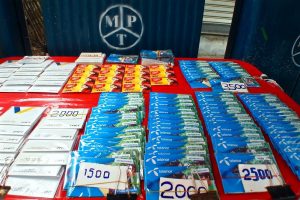The Norwegian telecommunications firm Telenor Group has decided to write off the value of its operation in Myanmar, in light of the country’s deteriorating security and human rights situation, the company announced yesterday.
Citing the country’s “irregular, uncertain, and deeply concerning situation” since the military’s February 1 coup, the company fully impaired Telenor Myanmar in its first-quarter accounts, booking a loss of 6.5 billion kroners (around $783 million).
“Due to the worsening of economic and business environment outlook and a deteriorating security and human rights situation, we see limited prospects of improvement going forward,” CEO Sigve Brekke said in a statement.
Telenor, which serves 187 million customers in nine countries in Europe and Asia, including 18.2 million in Myanmar, said it would continue to operate in the country for the time being, with a focus on “the safety and security of our employees, access to services for customers, and continued transparency.”
The Myanmar military’s seizure of power has plunged the country into an intractable crisis, with ongoing nationwide protests, widespread strikes and work stoppages, and flaring conflicts in the borderlands.
In the face of the massive popular protests against the coup, the junta led by Sen. Gen. Min Aung Hlaing has imposed tight network restrictions. On March 15, it ordered a nationwide shutdown of mobile data that has since cut Telenor’s subscription and traffic revenues in the country in half, the company said.
“Telenor calls on the authorities to immediately reinstate unimpeded communications and respect the right to freedom of expression and human rights,” it said in the statement.
Despite this, the company said that it still added some 2 million users in Myanmar during the quarter due to rising call volumes.
Telenor was one of two international telecommunications firms (the other was Qatar’s Ooredoo) that entered the Myanmar market in 2014, during the period of political and economic reform under then President Thein Sein.
As well as signaling the growing interest of international investors in a nation then seen as Asia’s last frontier, the two firms’ arrival in Myanmar were also politically significant. Before the advent of Ooredoo and Telenor, mobile SIM cards had cost thousands of dollars, severely restricting communications and internet access for most of Myanmar’s population.
When Telenor officially launched its operations in Myanmar in September 2014, the price of SIM cards plunged to just 1,500 kyats (about $1.50), and together with inexpensive smartphone handsets, helped transform Myanmar’s information environment nearly overnight.
“The world will never see anything like this again,” Brekke, then the head of Telenor Group’s Asia operations, said on the occasion of the company’s official launch in Yangon in October 2014. “The people of Yangon are among the many millions in Myanmar who have never owned or used a mobile phone before. Starting today, their lives will change.”
Telenor’s decision to write off its Myanmar operation is another sorry sign of the reversal of hope and expectation that has taken place in the country since the coup, forcing a host of international companies, including Japan’s Kirin and South Korea’s POSCO C&C, to reassess their operations in the country amid a tanking economy and widespread human rights abuses.
Tuesday also brought an announcement from India’s Adani Ports that it would abandon a Myanmar container terminal project and write down the investment if it is found to be in violation of recently imposed U.S. sanctions.
Judging from the troubled situation on the ground, these companies won’t be the last to head for the exits.

































